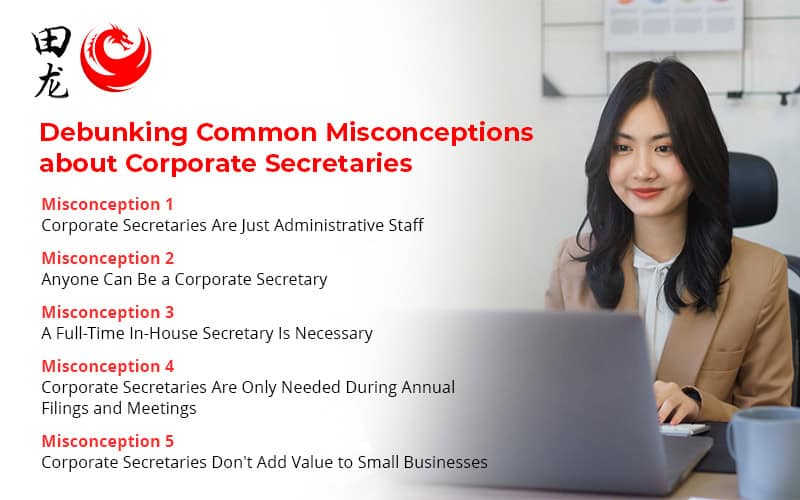The role of the corporate secretary in Singapore has evolved significantly over the years. Traditionally, corporate secretaries were primarily tasked with administrative duties such as maintaining meeting records, filing annual returns, and handling other internal responsibilities. These functions were essential for ensuring compliance and smooth operations.
However, as corporate governance standards have advanced and business management has become more complex, the responsibilities of the corporate secretary have transformed. In today’s digital age, technology has taken over many administrative tasks, freeing corporate secretaries to take on more strategic responsibilities.
In Singapore, the modern corporate secretary has become a key player in business operations. Not only ensuring compliance, these professionals also drive organisational success through strategic advisory, corporate governance oversight, and business development. In this article, we will explore the historical shift of the corporate secretary from a record keeper to a valued strategic advisor.
Evolution of the Role of Corporate Secretary
From Compliance to Strategy
In the past, hiring a company secretary meant focusing on maintaining meeting minutes, filing documents, and ensuring that statutory requirements were met. While these administrative functions were essential, they were limited in scope. Nonetheless, over time, the position of a corporate secretary has broadened significantly.
With the global emphasis on corporate governance strategy and the increasing uncertainty of business operations, corporate secretaries are now integral to strategic decision-making at the highest levels. The transformation reflects the greater changes in corporate governance practices, particularly as businesses have grown more complex and regulatory environments have become more stringent.

Singapore’s secretary services are not just about maintaining compliance; they also emphasise navigating evolving regulations, adapting to new challenges, and preparing for future changes. This corporate secretary evolution supports a company’s strategy and long-term success.
1. Influencing Strategic Direction
One of the most significant changes in the role of the corporate secretary is their involvement in shaping a company’s strategic direction. Beyond ensuring regulatory compliance, corporate secretaries now offer valuable insights into governance that influence decision-making processes. They help align corporate practices with both regulatory requirements and broader business goals. By leveraging their knowledge of the legal landscape and best corporate governance practices, corporate secretaries assist in mitigating potential legal risks and guiding businesses through complex legal frameworks.

2. Crisis Management Expertise
Corporate secretaries have also become key players in crisis management. In times of organisational turmoil, whether due to legal disputes, regulatory challenges, or public relations issues, corporate secretaries often take the lead in managing legal matters. Their expertise in corporate governance and regulatory compliance ensures a company remains stable and adheres to its legal obligations during challenging times.
The Corporate Secretary Throughout the Business Lifecycle
The role of the corporate secretary extends beyond day-to-day administrative duties, shifting to meet the specific needs of a business at every stage of its lifecycle. From the early stages of a startup to the challenges faced by mature companies or those in decline, corporate secretaries play a part in ensuring corporate governance, regulatory compliance, and strategic alignment. Here’s how their involvement varies throughout different phases of the business lifecycle governance:

1. For Startups
For startups, the corporate secretary is crucial in laying a solid foundation for long-term success. In the early days, their main responsibility is to establish appropriate governance structures that will support the business as it grows. This includes setting up the company’s legal framework, drafting corporate policies, and ensuring compliance with relevant regulations from the outset.
By offering guidance on these key areas, corporate secretaries prevent potential legal and regulatory issues that may arise down the line. Their proactive involvement equips startups with the necessary tools and processes to build a strong, sustainable business.
2. During Growth Phases
As businesses move into the growth phase, corporate secretary services in Singapore become even more integral. With expansion often comes increased regulatory and corporate governance complications, corporate secretaries are tasked with keeping business compliant with both Singapore’s laws and international standards, if applicable.
During periods of growth, secretaries assist in adapting governance structures to accommodate new business units, expanding operations, or entering new markets. Their ability to manage these intricacies paves the way for smooth business operations, helping business owners maintain a strong reputation in the market.
3. For Mature Companies
In mature companies, corporate secretaries keep governance practices consistent and effective. They play a part in maintaining strong compliance frameworks and overseeing ethical operations across the organisation.
At this stage, corporate secretaries safeguard the company’s reputation by securing stakeholder trust through transparency and accountability. It is also their responsibility to ensure that corporate decisions are in line with both legal obligations and long-term business objectives. The key is to create an environment of stability and good corporate governance. This consistent oversight is important in fostering relationships with investors, employees, and other stakeholders.

4. In Decline or Closure
When businesses face downturns or the difficult decision of closure, the corporate secretary’s responsibilities become even more vital. In these circumstances, they guide the company through restructuring, liquidation, or insolvency processes.
Corporate secretaries determine whether these processes are conducted in full compliance with legal obligations, protecting stakeholders’ interests and mitigating potential legal risks. Their expertise is indispensable in managing regulatory requirements, ensuring that the company adheres to all necessary legal and financial protocols. Moreover, corporate secretaries manage stakeholder communications during times of decline or closure. They maintain an ethical approach to handling assets, liabilities, and employee concerns.
Future Outlook for the Role of Corporate Secretaries
Key Trends Redefining the Role
As businesses continue to navigate a fast-evolving corporate environment, the role of corporate secretaries is undergoing significant transformation. New trends are shaping the profession, pushing it towards greater integration of technology, a focus on Environmental, Social, and Governance (ESG) principles, and the adoption of flexible service models. Here are some key developments expected to redefine their role in the years to come:
1. Embracing Technology
The digital revolution is reshaping how organisations approach regulatory compliance, corporate governance, and record-keeping. Corporate secretaries are now leveraging advanced digital tools and technologies to automate routine tasks such as document management, regulatory filings, and meeting scheduling. These tools not only improve efficiency but also enable real-time data tracking and reporting, providing insights for strategic decision-making. In Singapore’s tech-savvy corporate landscape, staying at the forefront of digital advancements will be vital for corporate secretaries to maintain their relevance and enhance their contribution to organisational success.
2. ESG Compliance Integration
The growing emphasis on Environmental, Social, and Governance (ESG) considerations is redefining the priorities of businesses worldwide. In Singapore, where sustainability and ethical governance are becoming the priorities, corporate secretaries are working on ESG compliance integration. On top of keeping companies compliant with evolving ESG regulations and reporting standards, corporate secretaries also advise on building stakeholder trust and driving value creation. As ESG compliance becomes more central to corporate governance, the expertise of corporate secretaries in this domain will become more paramount.
3. Outsourcing for Specialised Expertise
For small and medium-sized enterprises (SMEs), maintaining a full-time corporate secretary may not always be feasible. As a result, outsourced secretarial expertise is gaining traction as a practical solution. Specialist providers offer scalable, cost-effective services that cater to the specific needs of businesses, from handling routine compliance to tackling complex governance challenges.
Outsourcing also provides access to seasoned professionals with specialised knowledge, ensuring that companies can meet their obligations without overextending internal resources. This trend is expected to continue as more businesses recognise the advantages of outsourcing for both cost efficiency and access to expertise.
4. Enhanced Role in Stakeholder Engagement
Corporate secretaries potentially become more central to stakeholder engagement, facilitating communication between the company’s management, shareholders, regulators, and other external parties.
As stakeholders demand more transparency and involvement, corporate secretaries are instrumental in managing these relationships and representing stakeholder interests in corporate decision-making. Furthermore, they will be more involved in providing regular updates, responding to shareholder inquiries, and promoting accountability.
Debunking Common Misconceptions about Corporate Secretaries
Despite their key contributions to business success, the role of corporate secretaries is often misunderstood. To appreciate the full value they bring, it’s essential to address some prevalent misconceptions and clarify the realities of this multifaceted profession.

-
Misconception 1: Corporate Secretaries Are Just Administrative Staff
One common belief is that corporate secretaries are solely responsible for clerical tasks like filing paperwork or recording meeting minutes. While administrative duties are part of their role, corporate secretaries go far beyond these functions.
They oversee compliance with legal and regulatory frameworks, ensuring that corporate governance practices meet local and international standards. Besides, they also act as key liaisons with external stakeholders such as auditors and regulators. Their ability to advise on corporate governance matters and provide strategic insights contributes to effective business management.
-
Misconception 2: Anyone Can Be a Corporate Secretary
Some people may misperceive that the responsibilities of a corporate secretary are straightforward without requiring specialised qualifications. In fact, the Companies Act in Singapore mandates that corporate secretaries meet specific eligibility criteria, including relevant qualifications and experience.
These professionals must possess an in-depth understanding of corporate principles, corporate governance, and compliance requirements. Their expertise provides insightful guidance to directors and senior management in navigating the intricacies of legal obligations and regulatory changes. This specialised knowledge highlights the capability of corporate secretaries, setting them apart from generic administrative staff.

-
Misconception 3: A Full-Time In-House Secretary Is Necessary
While larger organisations may benefit from having a full-time corporate secretary on staff, this is not a universal requirement. Nowadays, many SMEs outsource corporate secretarial services, ensuring flexibility and cost-effectiveness.
Outsourced providers bring specialised expertise to handle compliance and corporate governance tasks, allowing businesses to fulfil their obligations without the overhead of a full-time hire. Thanks to this model, smaller companies can access professional-grade support, simultaneously focusing on growth and other core activities.
-
Misconception 4: Corporate Secretaries Are Only Needed During Annual Filings and Meetings
Some may believe that corporate secretaries only have a role during key annual events, such as annual general meetings (AGMs) or the filing of yearly returns. The truth is that the role of a corporate secretary is ongoing and dynamic. They provide continuous support throughout the year — ensuring a company’s adherence to changing laws, assisting with corporate restructuring, and guiding on governance best practices.
-
Misconception 5: Corporate Secretaries Don’t Add Value to Small Businesses
Some small business owners may assume that the services of a corporate secretary are unnecessary for their operations, viewing them as an added expense. However, having a corporate secretary—even for smaller businesses—can be invaluable.
From ensuring regulatory compliance to advising on best governance practices, corporate secretaries help small businesses build a solid foundation for growth. Their expertise in navigating legal and regulatory challenges frees business owners to focus on their core operations without worrying about potential legal pitfalls.
Frequently Asked Questions
1. Can we outsource company secretarial services?
Yes, many businesses outsource their company secretarial functions to specialised firms, which offer expertise and flexibility while ensuring regulatory compliance and corporate governance.
2. How does outsourcing company secretarial services benefit my company?
You gain access to experienced professionals and reduce costs compared to hiring in-house. This allows you to focus on core business activities while corporate governance is professionally managed.
3. Is a corporate secretary the same as an administrative assistant?
No, while corporate secretaries perform administrative tasks, they have much broader responsibilities. These include regulatory compliance, corporate governance, legal advisory, and communication with stakeholders.
Conclusion
Today, corporate secretaries have evolved into key players in strategic decision-making, governance, and compliance, expanding their role far beyond basic record-keeping. They play a part in establishing robust governance for startups, supporting mature companies in maintaining ethical practices, and guiding firms through restructuring or closure. The future of this profession will continue to evolve, driven by technological advancements, a focus on ESG compliance, and flexible outsourcing solutions.
At Tianlong Services, we are an accountant company in singapore that recognise the significant role of corporate secretaries in ensuring a company’s success. That’s why our expert team is committed to helping you streamline business operations through professional corporate secretarial services.
Contact us to learn more.


